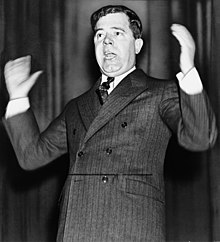1.
Allies
-United States, England, and Soviet Union (Russia) 2. Axis
-Germany, Japan, Italy
3. Defense spending
-Amount of money government spends on the military
4. Unemployment rate
-Percent of people unemployed
5. Federal outlay
-Amount of money the federal government uses to buy stuff
6. Rattlesnakes of the Atlantic
-(Number 7)
7. German U-boats
-German submarines
8. Isolationists
-Policy of "mind your business"
9. Appease
-To give in
10. Lend-Lease Act
-Law that allowed President of the United of the States (POTUS) to sell weapons to our friends
11. Office of Price Administration
-U.S. federal agency, established to prevent wartime inflation.
12. Inflation
-When prices for goods/service increases but income remains the same
13. Pres. Franklin D. Roosevelt
-Leading the United States during a time of worldwide economic depression and total war.
14. Pres. Harry S. Truman -After Roosevelt died, Truman lead the United States and successfully concluded World War II. Which after marked the start of the Cold War.
15. Phillip Randolph
-Leader of the African-American civil-rights movement, the American labor movement and socialist political parties.
16. Gen. Patton
-General in the United States Army, best known for his command of the Seventh Untied States Army, and later the Third United States Army, in the European Theater of World War II.
17. Gen. MacArthur
-Commanded Allied forces in the Pacific Theater during World War II.
18. Gen. Eisenhower, Supreme Commander of U.S. Forces
-Supreme Commander of the Allied Forces in Europe; he had responsibility for planning and supervising the invasion of North Africa in Operation Torch and the successful invasion of France and Germany from the Western Front
19. Adolph Hitler
-Germany, Nazis
20. Benito Mussolini
-Italy
21. Joseph Stalin
-Soviet Union/Russia22. Winston Churchill
-England/United Kingdom
23. Battle of the Bulge
-The last stand for Germany
24. D-Day
-Offensive by Allies to take over Europe
25. Auschwitz
-Jewish concentration camp
26. Atomic bomb
-Nuclear bomb dropped on Japan to end the war
27. Interment
-Camps on West Coast used to detain Japanese Americans
28. Income tax
-Percent of tax paid on personal income (paycheck)
29. Wage & price controls
-Commonly instituted by governments as a response to inflation, and usually below market level.
30. War bonds
-Debt securities issued by a government for the purpose of financing military operations during times of war.
31. WAACs
-Women's Army Auxiliary Corps (WWAC) was created as an auxiliary unit.
32. WWII Battles of the Pacific
-
33. GI Bill of Rights
-A law passed in 1944 that provided educational and other benefits for people who had served in the armed forces in WW2
34. Zoot-Suit Riots
-Series of Riots in 1943 that exploded in L.A between white sailors and marines stationed throughout the city and latino youths






